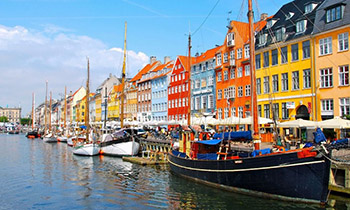How to open a business in the Denmark?
 According to the DOING JONES 2017 rating, Denmark is among the top-five countries with the most favourable business climate. A small country located on the Scandinavian Peninsula, has a high standard of living, a highly developed economy and strict tax laws.
According to the DOING JONES 2017 rating, Denmark is among the top-five countries with the most favourable business climate. A small country located on the Scandinavian Peninsula, has a high standard of living, a highly developed economy and strict tax laws.
Business in Denmark
Companies established in Denmark have free access to the EU markets. Own business in this country and absence of any restrictions is a great opportunity for conducting successful business activities.
Investors, who organized business in Denmark, note the following favourable points:
- Convenient geographical position, characterized by proximity to the rest of the EU member states, as well as direct access to the sea and further to the Atlantic Ocean,
- Almost complete absence of corruption,
- Low bureaucracy,
- Transparent legal, judicial and tax systems,
- High standard of living,
- Excellent infrastructure,
- Possibility to obtain residence permit,
- Concessional lending,
- Flexible taxation,
- Quick and easy way to establish a company.
Depending on the chosen field of activity and taxation system, business in Denmark is characterized by the existence of the following most optimal company forms:
- Individual entrepreneur.
The founder is an individual who is liable for the obligations of the enterprise with all its property. - Partnership.
The founders are two or more persons who are united for the collective management of the business. The founders are liable for the debts of the company, in person or together. The authorized capital is not formed; a partnership agreement is concluded. - Joint-stock company with limited liability.
The founders can be both individuals and legal entities. The liability of the founders is limited to the value of their contributions to the company's capital.
Registration of Business in Denmark
Denmark has many business support and development programs. One of them is START-UP DENMARK, headed by the Ministry of Entrepreneurship and Growth, aimed at talented entrepreneurs who want to start their own business in the kingdom.
As a rule, registration of business in Denmark takes 2–3 days from the date of filing documents with the Register and consists of the following stages:
- Verification of the uniqueness of the company name,
- Preparation of all necessary documents,
- Opening account in a local bank to which funds in the form of share capital will be deposited,
- Registration of the company in the registration authority,
- Registration in the tax authority,
- Registration of employees in case of need.
In some cases registration of business in Denmark may be accompanied by a license.
Important information:
- Certain groups of foreign employees pay a reduced income tax for 5 years,
- Denmark signed a number of international agreements on double taxation,
- IT, medicine and scientific research are priority areas of business supported by the state,
- Tax system provides for preferential treatment for foreign holding companies that contributes to the creation of a network of foreign branches and representative offices in the country.
Doing business in Denmark, as in any other country, is a complex and toilsome process. Contact our company and you will receive detailed qualified advice that minimizes your financial risks.
Please, select organizational and legal form of the company You are interested in:
For reference:
- Anpartsselskab (ApS) , Limited Liability Company In such a company have a minimum registered capital of 80 000 DKK (about 10,500 euros) and requires one director (person of any nationality). Most often, the Danish company type ApS used as holding companies (as obtained under certain conditions, as well as dividends paid may be tax exempt), as well as trademark owners and licensees ;
- Aktieselskab (A / S) , a public corporation. CC is a company 500 000 DKK (about 65 000), 25 % of which must be paid during the registration process. Director (majority of directors) of the company must be a citizen of the EU ;




























































